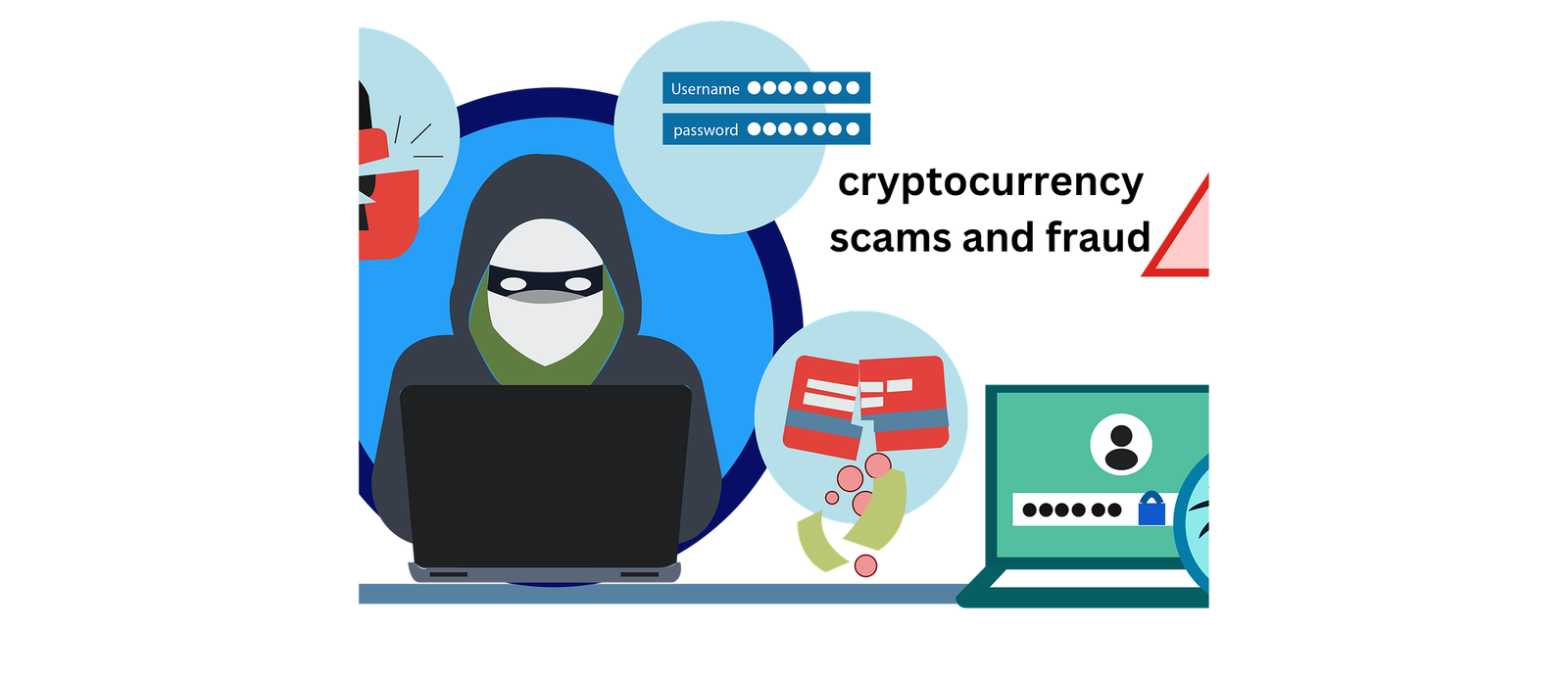Cryptocurrency scams and fraud generally refer to any situation where an offender aims to deceive an individual through the use of fraudulent techniques to get or steal his/her bitcoins or any other cryptocurrency. They include phishing, where an attacker disguises themself as a different individual to get access to the target’s private keys or other identities; Ponzi schemes, where these attackers popularly promise increased returns on investment through money from new members; new coin/ICO scams which are convincing fake crypto ventures that are selling nonexistent tokens. Other schemes include the pump and dump schemes where one creates a specific cryptocurrency and makes it more popular to reap what is out of the reduced stock of the given cryptocurrency. Normally, these scams exploit the lack of guarantors, rubblization, and technicality inherent in the digital currency trading arena leading to tremendous losses amongst the swindled individuals. Other factors that also come as the advantage of cryptocurrencies are; Being based on Blockchain, various perceptions are decentralized and the users of these products have pseudonyms; then, they cannot reclaim their lost property.
Introduction to Cryptocurrency Scams and Fraud
Such type of fraud in the meanwhile is regarded as the primary trend in the increase of the crime rates in the sphere of digital finance, which reflects characteristics of the blockchain. These activities make it possible for those who are engaged in the undertaking to swindle many people of their cash, and everyone in the entire world of cryptocurrency markets is painted in a bad light. That is why the case in front of us substantiates the evidence that the technology used in creating digital currency, based on Bitcoin and Ethereum, is precisely what has been realized by the global banking system as well as real investors and hackers. Indeed ‘scam tactics’, as a result of being in the criminal category just like other practices, are increasing in the selection of new investors to invest not to mention those who have been in the profession for quite some time. Although it is possible to make big profits through the use of cryptocurrencies, regrettably, it remains impossible for people to pay enough attention to the fact that while buying some form of investment, they expose themselves to some serious risks. This is an eye-opener when one gets to realize that there are still some people out there who are illiterate and that as individuals, people need to educate themselves and especially be cautious with fraudsters. Because cryptocurrencies are distinct in the qualities of digital and decentralized assets, the current overseeing bodies are under more pressure to escalate their actions to be able to run in such an environment. However, if considering the architecture of the blockchain, as it exists at the moment, we can focus on the fact that it seems to be an issue for the traditional tools of regulation and oversight. It follows that efforts to combat instances of cryptocurrency scams must involve at least these multiple approaches: legislative actions by the government, cooperation among the stakeholders in the blockchain and crypto space, and the fight in the public domain. It therefore advocated the practice of the implementation of more responsible and thus transparent financial policies by the stakeholders with regards to the protection of consumers to reduce the likelihood and impact of cryptocurrency scams in the global markets as a result.
Common Types of Cryptocurrency Scams
There are many types of cryptocurrency scams, and all of them employ a distinct technique that allows them to gain unauthorized access to a person’s profile online. Pyramid schemes operate under a mechanism in which one has to persuade several people to invest their money to gain high profits; the earlier investors earn their money from the subsequent investors, and this continues until little capital is gained from new investors. Phishing is a process where the attacker tries to lure the user over electronic mail through fake websites or messages posted on social networking sites and tries to extract their identification numbers or login name and password.ICOs can also be understood as cryptocurrency exchange frauds, connected with new potential projects, promising high revenues, while fraudsters take money from people.
Cryptojacking and mining are the remaining threats that aim to leverage the users’ wallets and exchanges and receive unauthorized access to their bitcoins. The impersonation continues to be a reliable approach by the fraudsters who pose as celebrities on social media to lure other persons into giving them their hard-earned money and properties. Therefore, for the people who feel like they have been caught by these scammers and do not wish to end up like Wex – there is still hope for changing and adopting new strategies to kind of set a shield to avoid the vice of falling victim to the cryptocurrency scams.
Phishing and Social Engineering in the Crypto World
Once again, weak points include hazardous actions such as phishing and social engineering activities because they focus on psychological vulnerability and channels for communication within the cryptocurrency system. Some hackers seek to mimic the look and feel of legitimate cryptocurrency websites and those whose intentions are innocent impact them making them reveal their real personal information. Social engineering involves changing peoples’ perceived attitudes towards a particular issue or persuading people to disclose information that is bad for them. This is usually done in a way that the person initiating the fraud seems legit to the intended victim, and this may be something as simple as a customer care representative or even another investor.
Besides posing an immediate danger or elevating the victim’s emotional state, it must be noted that scammers utilize psychological “loopholes” the victims do not protect themselves from. As for phishing and SE attacks, the risk is real and stable, hence, it has to be managed: users should be extremely cautious while working with spam and similar messages, and, in any case, should double-check the identity of the sender when this man requests some secret information from the addressee. Through raising awareness one can, therefore, avoid being a victim of these common threats by being alert and implementing the appropriate precautions to avoid hacking.

Ponzi Schemes and Fake Investment Opportunities
Frauds, fake money-making opportunities, and lottery, pyramid, and Ponzi schemes are still evident among the participants when the cryptocurrency market though there exists a high level of awareness and understanding among the players in the market. These schemes provide Inflated returns with negligible risk enabling people to relinquish their hard-earned cash in the expectation of becoming affluent within the shortest possible time. It is a con game in which returns are paid initially from the investment capital to lure more and more investors into the venture thus creating the perception that it is genuine business while in actual sense it is a scam to defraud the investors.
Similarly, phantom investment schemes involve the unsuspecting public through gimmicks like cream-legged and false endorsements to do the rest of the lowlife’s rip-off and again, they clear out when things get worse for them. To avoid becoming victims of these so-called Ponzi schemes and other similar fake business opportunities, one always needs to have a critical approach and always be suspicious of business ventures that promise very high returns on investment. Exploring the projects, carrying out a vigorous investigation of the backgrounds of the project originators, and cross-checking with authenticated sources would alleviate the incidence of people losing their hard-earned money.
Rug Pulls: How Fraudsters Exploit DeFi Projects
Understanding DeFi and its Vulnerabilities
DeFi emerged as a new concept for solving problems in the existing financial market, providing a user with an opportunity to use the services of traditional financial systems without involving a mediator with the help of blockchain technologies. Be cautious with smart contracts, which are the building block of the DeFi platforms and that perform transactions alongside increasing their openness. However, DeFi’s decentralized nature also has its demerits, or let’s call it drawbacks or people may perceive it from the lens of perspective. In that case, DeFi projects do not have a central governing body to handle numerous concerns, of which concerns emanating from the smart contract code are some of the concerns that may arise. In addition, new tokens and projects are being launched at the rate of knots, especially in the DeFi section, which often overtakes security solutions.
Characteristics of Rug Pulls
Project Rug Pulls is a recent and direct form of fraud carried out by scammers in the decentralized finance community. These scams mostly involve developers of the DeFi projects to pull liquidity out of the pools making tokens which is related to the pools to have a low price. Unlike the Ponzi scams, rug pulls take advantage of the decentralization nature of decentralized application in the DeFi sector which makes it challenging for the investor to seek assistance and the offenders arrested. The observations are one-sided actions from the side of project developers, the actions that were unexpected and coordinated, the results that are non-materialized and provided to investors with empty hands, the obtained assets which in the end are revealed to be worthless, and people have lost their money.
Case Studies: Notorious Cryptocurrency Scams
Crypto scams have become shockingly more widespread, leaving a trail of destroyed individuals and labeled many high-profile crypto scams. Scams include OneCoin which Andrianov was linked to where investors globally were defrauded of billions of dollars with fake promises of advanced technology and high profits. Likewise, The BitConnect scheme involved investors in its contract which guaranteed them high profits through the lending platform, where investors lost significantly of their investments when suddenly, the entire venture crumbled. The PlusToken fraud stood as one of the largest Ponzi schemes involving cryptocurrencies and targeted users with a mobile wallet service that embezzled $2 billion in money from them. These types of situations are considered valuable lessons and loud signals to increase the attention and strict control of regulators in the sphere of cryptocurrencies. Investors should be more cautious in the future by avoiding such scams paying attention to what happened to the scammers and applying caution when investing so as not to be conned again.
Regulatory Measures and Legal Actions Against Crypto Fraud
Another main issue of cryptocurrency scams relates to preventive and remedial legal and regulatory actions that have been undertaken to protect the investors and also ensure that the efficiency and integrity of the markets were not compromised, which in current markets have seen governments and various regulatory agencies intervening more aggressively. Through enforcement actions and regulatory proceedings particularly in the United States via the Securities and Exchange Commission SEC, authorities are extending more attention to adopting bitcoin-related projects and trading platforms for fraud. It is the international cooperation of supervisory bodies to deal with the cross-border aspect of crypto scams as there is an intention to support cooperation in exchange of information or operation against persons connected to crimes in two or more countries.
The degrees of protection like compulsory consumer identification (Know Your Customer – KYC) and the various measures against money laundering (AML) serve to eliminate some sort of anonymity and the use of cryptocurrency for fraudulent purposes. There is an increase in legal cases against individuals involved in cryptocurrency scams as there are increased arrests and charges of lawbreakers involved in these scams, as well as, an increase in civil actions by the individuals who have been defrauded. Last but not least, prohibiting the individuals involved in cryptocurrency scams and making them pay the consequences involves an aim to prevent any such incidents in the future and protect the investors.

How to Protect Yourself from Cryptocurrency Scams
Cryptocurrency scams can be eliminated solely by prevention measures, and by adhering to the main guidelines for ensuring data security and risk management on the Internet. Typically some conscious and rational decision-making during selection would include several steps, such as finding out who is behind the project – for many investors this is the most critical step, going through the paperwork related to the project both in its preparation stage and at the later developmental stage, and then getting some third party validation of facts presented. Also, one should protect one’s cryptocurrency profiles by setting a passphrase to them and turning on 2FA so that one cannot be tricked into falling for a phishing attack. Passing of information on social media accounts should be done cautiously and one should avoid receiving text on the phone and email inboxes as it opens the door to these social engineering tricks.

No Responses